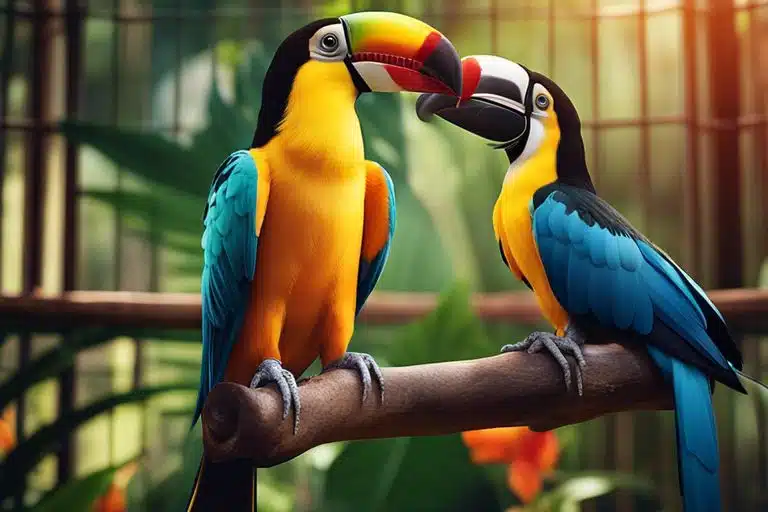Exotic birds, with their vibrant colors and unique personalities, are fascinating creatures that can make wonderful companions. However, caring for exotic birds demands commitment and knowledge to ensure their well-being. From understanding their dietary requirements and social needs to providing a nurturing environment and regular veterinary care, there are imperative aspects that every bird owner should consider. In this comprehensive guide, we will research into the crucial factors of caring for exotic birds, including proper nutrition, environmental enrichment, social interaction, and health maintenance, to help you provide the best possible care for these remarkable avian pets.

Identifying Types of Exotic Birds Suitable as Pets
Little is more exciting than bringing home an exotic bird as a pet. However, not all exotic bird species are suitable for every household. It’s necessary to consider various factors before choosing the right feathered companion. After all, proper research and understanding can make a world of difference in providing the best care for your avian friend.
| Main Features | Factors to Consider |
| Colorful plumage, intelligent, vocal | Behavioral needs, nutritional requirements |
| Large, sociable, energetic | Space availability, socialization opportunities |
| Smaller, playful, curious | Environmental enrichment, veterinary care |
| Quiet, affectionate, independent | Temperament match, financial commitment |
| Rare, exotic, challenging | Knowledge required, patience needed |
Popular Pet Bird Species
Exotic bird species that are commonly kept as pets include the majestic Macaws, charismatic Cockatoos, intelligent African Grey Parrots, colorful Conures, and sociable Budgerigars. Each species has unique nutritional requirements, socialization needs, and behavioral characteristics that make them suitable for different types of bird enthusiasts. By understanding the specific traits of these bird species, potential bird owners can choose the right companion that aligns with their lifestyle and preferences.
Factors to Consider When Choosing an Exotic Bird
- Environment: Consider the space available in your home and the specific environmental needs of the bird species you’re interested in.
- Socialization: Some birds require more social interaction and companionship than others, so it’s crucial to assess your ability to meet these needs.
- Nutrition: Understanding the dietary requirements of the bird species is necessary for providing a balanced and nutritious diet.
- Veterinary Care: Regular veterinary check-ups and access to an avian veterinarian are vital for the health and well-being of your bird.
- Behavioral Needs: Different bird species have varying behavioral traits that may require specific training and enrichment activities to keep them mentally stimulated and happy.
Factors to consider when choosing an exotic bird extend beyond superficial characteristics such as color or size. While the appearance of a bird may be appealing, it’s necessary to look deeper into the bird’s requirements and care needs. Assume that each bird species has its own set of challenges and rewards, requiring potential bird owners to be well-prepared and committed to providing the best possible care for their feathered friend.
Essential Tips for Exotic Bird Care
You’ve decided to bring an exotic bird into your home, and now it’s time to ensure you provide the best care possible for your feathered companion. From setting up their cage to understanding their dietary needs, here are some necessary tips to help you care for your exotic bird with expertise and compassion.
Step-by-Step Daily Avian Care Routine
| The Basics | Additional Care |
|---|---|
| Check food and water | Provide fresh fruits and vegetables |
| Clean bottom of the cage | Engage in socialization and playtime |
| Monitor behavioral signs | Schedule regular veterinary check-ups |
Recognizing and Addressing the Unique Needs of Exotic Birds
The care of your exotic bird goes beyond the basics of food, water, and cleanliness. Exotic birds have nutritional requirements that may include a diverse range of fruits and vegetables to maintain their health. Socialization is also crucial for these remarkable creatures, as they require mental stimulation and social interaction to thrive. Recognizing signs of illness and promptly seeking veterinary care is necessary to ensure your bird’s well-being.

Long-term Welfare and Enrichment Strategies
Designing a Stimulating Environment for Pet Birds
For pet birds, providing a stimulating environment is crucial for their well-being. Little things like offering a variety of toys, perches, and activities can go a long way in keeping your feathered friend mentally engaged and preventing boredom. Ensure your bird’s cage is spacious enough for movement, and include perches of varying thickness for foot health.
Pros and Cons of Different Welfare Approaches
Enrichment in a bird’s daily life is important for their overall welfare. Here are some pros and cons to consider when designing an enriching environment for your pet bird:
| Fulfillment of natural behaviors | Potential for aggression if enrichment is lacking |
| Mental stimulation and exercise | Overstimulation leading to stress |
| Prevention of boredom and destructive behavior | Difficulty in finding appropriate enrichment options |
Advanced Exotic Bird Care
Now, let’s probe into the crucial elements of advanced care for your exotic bird:
- Managing Veterinary Needs and Healthcare
Healthcare
In the context of caring for your exotic bird, ensuring their health and well-being is paramount. Regular veterinary check-ups with an avian veterinarian are crucial to monitor your bird’s health and catch any potential issues early on. Pay close attention to signs of illness such as changes in behavior, appetite, or droppings, as birds often hide symptoms of sickness. Additionally, be proactive in administering any necessary vaccinations and preventative care recommended by your vet to keep your bird in optimal health.
- Understanding Avian Behavior and Training
Advanced care for exotic birds also involves understanding their behavior and providing appropriate training. Each bird species has unique behavioral traits and learning capabilities. Spend time observing and interacting with your bird to better understand their needs and preferences. Positive reinforcement techniques can be used to teach your bird commands or tricks, which not only strengthens your bond but also provides mental stimulation for your feathered companion. By providing regular veterinary care and understanding your bird’s behavior and training needs, you can ensure that your exotic bird thrives in your care. Do not forget, the key to maintaining a healthy and happy relationship with your avian pet lies in dedication, knowledge, and attentive care.
To wrap up
So, caring for exotic birds requires dedication, knowledge, and a genuine passion for these remarkable creatures. By understanding their unique needs, providing a nurturing environment, a balanced diet, mental stimulation, and regular veterinary care, you can ensure that your exotic bird lives a happy, healthy, and fulfilling life as a beloved member of your family. Do not forget, the bond you form with your bird through proper care and affectionate interaction can be incredibly rewarding for both of you.
FAQ
Q: What are the key considerations when caring for exotic birds?
A: When caring for exotic birds, it is crucial to understand their specific dietary requirements, social needs, environmental preferences, and the importance of regular veterinary care for their well-being.
Q: How can I create a suitable environment for my exotic bird?
A: To create an ideal living space for your exotic bird, ensure the cage is spacious with a variety of perches, maintain appropriate temperature and lighting conditions, and practice regular cleanliness to prevent the buildup of bacteria.
Q: What should I include in an exotic bird’s diet for optimal health?
A: A balanced diet for exotic birds should include fresh fruits and vegetables, high-quality pellets designed for their species, and limited treats to avoid health issues. Regularly providing a varied diet is crucial for their nutritional needs.
As a bird enthusiast with a passion for sharing the wonders of our feathered friends. As a writer and nature lover, I'm thrilled to connect with fellow bird buffs and inspire others to take flight into the fascinating world of birds. Let's wing it together!


